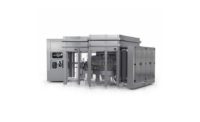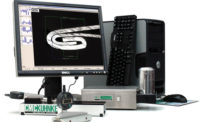Can package innovation, proliferation impacts filling, seaming equipment
Craft beer manufacturers have specific requirements

Whether its craft beer or carbonated soft drinks (CSDs), beverage-makers increasingly are utilizing aluminum cans, in a variety of sizes and styles, to package their products. As this convenient, on-the-go and sustainable packaging format proliferates across beverage categories, can filling and seaming manufacturers are providing solutions that meet the needs and expectations of beverage manufacturers.
In the non-alcohol sector, the use of slim cans and smaller volume cans is increasing in the marketplace, but the growing use of cans in the alcohol sector also has impacted can filling and seaming manufacturers, notes Bear Marmy, area sales manager for North and South American markets at Switzerland-based Ferrum.
“The government is pushing the beverage industry to reduce sugar content and serving sizes for carbonated beverages like Coke, Pepsi, Dr Pepper, etc. This has resulted in increased numbers of cans, such as sleek or slim, with smaller volumes,” he explains. “Besides the growth of craft brewing, there are also other producers of ‘fashion drinks’ increasing the variety of available drinks with different flavors and qualities — alcoholic or non-alcoholic.”
When it comes to alcohol products, the craft beer market has placed particular demands on can filling and seaming manufacturers during the past several years, notes Barry Fenske, director of filling technology at Franklin, Wis.-based Krones Inc.
“Being able to take craft beer to places off-limits to glass has created a huge push in this industry,” he says. “The misconception that you don’t put craft beer in cans has been put to rest. A huge uptick in requests for information and pricing has occurred in the last two to three years and is still ongoing.”
However, craft beer manufacturers have unique requirements. Industry players generally are looking for solutions with smaller footprints and lower price points while still providing quality performance.
“[We’ve met these demands] by doing just that — making them smaller, stripping away the bells and whistles to get them to a price level the craft beer guys can afford, but you keep the same filling valve technology,” Fenske says.
To assist craft beer manufacturers, Krones offers the Craftmate, a can filler specially designed for the craft beer market. “[Krones offers] volumetric can fillers — the most accurate machines out there,” Fenske explains. “From 80 [cans per minute] (CPM) [to] 2,200 CPM, with an oxygen pick-up guarantee that protects the customer’s package. Our most recent addition is the Craftmate can filler for craft brewers — smaller footprint and less expensive to fit that 80 [to] 250 CPM need when they are ready to step up from an inline solution doing 30 CPM.”
The Craftmate also provides the flexibility to process various can sizes and formats and also has the ability to handle CSDs, in addition to beer, according to the company’s website. It also features a compact design and easy machine cleaning, it states.
Choosing solutions
For manufacturers looking to invest in canning equipment, several factors should be considered, according to suppliers. Among them is the type of product that will be packaged in the can. Different products are kept at different temperatures and can have different consistencies, experts note. Because of this diversity, procedures for optimizing oxygen reduction and hygienic handling, among others, might need to be adapted, Ferrum’s Marmy explains.
“Gassing, bubble-breaker and cleaning procedures are different and must be adapted accordingly,” he says.
“... Testing efforts for quality assurance [should be] increased,” he continues. “[The] variety of can closures [require] dedicated format changeover tests in dedicated setups. Lightweight cans challenge old seaming machines.”
Several quality control aspects should be addressed by the can seaming equipment, which also should be understood and considered by beverage manufacturers, Marmy says.
“[The] provided seam shall be guaranteed in high quality and remain stable for [a] long time,” he says. “Other arguments may depend on [the] filled product, however, a general goal is to provide equipment and process devices reducing oxygen content as much as possible. It’s also important to provide machinery with easy and safe access for maintenance and cleaning. Hygienic machine design is highly appreciated by customers.”
Operation modes, opportunity costs and future plans also should be taken into consideration when selecting can filling and seaming equipment for a beverage facility. Additionally, sustainability has begun to play a role in beverage-makers’ selections, which Ferrum has taken into consideration throughout its portfolio, Marmy says.
“The overall goal is to reduce the footprint on one hand and improve the performance, uptime as well as the safety in a healthy working environment,” he says. “It is important for Ferrum to provide sustainable products, which need less energy, less material and less supplies. One example is that all [of] our seamers automatically control the consumption of gas and cleaning liquids adapted to the speed of the process, which means that with a minimum of material used, a maximum result can be achieved.”
Ferrum offers a portfolio of high-speed can seaming machines for the food and beverage industry, Marmy adds.
“Ferrum can seamers deliver maximum availability and ensure high production quality, a fast set-up and guarantees a long product life,” he says. “In addition, Ferrum provides around-the-clock worldwide service, fast delivery and availability of spare parts. Big accounts in the food/beverage industry around the world profit from our experience in dry powder or liquid products filled into steel, aluminum or composite cans. Ferrum provides … hotline support, trainings and professional field service.”
Krones’ Fenske sums up the necessary considerations simply. “It’s all about shelf life. Who can fill their product and protect its integrity?” he says. “Also, who can support the equipment in a timely matter; that’s why we’ve put extra focus on localized service availability.”
Also noting many of the need states of canned product manufacturers, Switzerland-based Sidel expanded the Sidel Matrix range of equipment with the introduction of the EvoFill Can, a can filler that provides performance, flexibility, cost savings and sustainability, the company says.
“Having undergone a complete redesign, the new solution is able to manage a wider range of cans, filling temperatures and beverage types,” the company said in a statement at the time of the launch. “Electronic magnetic flow meters allow for filling cans at speeds of over 2,000 cans per minute with high levels of accuracy. EvoFILL Can brings great performance filling to high-quality beverages like low carbonated drinks or flash-pasteurized beer to enable manufacturers to turn the challenges of today into opportunities of tomorrow.”
Looking ahead, Ferrum’s Marmy notes that lightweighting materials, unique can shapes and closures, and increased hygienic demands will proliferate in the market.
As a result of the proliferation of cans in various beverage categories, Krones’ Fenske foresees opportunity. “There is potential for the [bottled] water industry as aluminum is easier to recycle than plastic,” he says. “Honestly, the innovation is there. The issue is the same that clouded the craft beer guys for years: ‘You don’t produce that in cans.’ Maybe that mindset will change.” BI
Looking for a reprint of this article?
From high-res PDFs to custom plaques, order your copy today!









